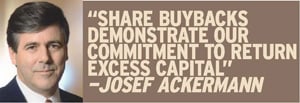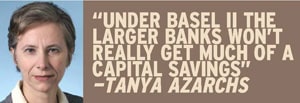How to deal with the surplus capital on their balance sheets has become a key challenge for many financial institutions.

|
For some companies, not having enough capital is a constant source of headaches. However, the situation is quite different for many global banks, as they are now sitting on stock-piles of cash. HSBC chairman Sir John Bond brought the issue clearly into focus in August, with a warning that the worlds five biggest banks would use an expected $60 billion in surplus capital over the next two years to launch a price war and un-dercut their rivals.
Some analysts took his statement to mean banks would unleash a bidding war for acquisitions. With banks possibly tempted to soak up low-margin business, some analysts speculated they might be better servedas HSBC has already shownby using surplus capital to fund acquisitions and consolidate capacity.
That is a significant amount of capital to reinvest in the business against the background of the current market con-ditions, Bond said after announcing HSBCs record first-half 2004 profits of $9.37 billiona 53% increase over the same period last year.He added,It would be unwise to relax. Indeed, after leading some high-profile acquisitions in recent years that have given it a global franchise, HSBC has since set its sights on China, where it already owns stakes in the Bank of Shanghai and Industrial Bank, reaching an agreement in principle in August to take a stake in Bank of Communications, the countrys fifth-largest lender.

|
Sir Johns comments came as little sur-prise to many banking analysts, who say the bidding war is already under way, us-ing acquisitions as a way to invest surplus capital. Banks have been in an acquisi-tion mode, and so what well see is a continuation of a trend thats already there, says Tanya Azarchs, a bank credit rating analyst at Standard & Poors in New York. The worlds highest-rated banks have consistently generated earn-ings above their capital needs, for which they have had to make decisions as to how to best deploy them.
Banks Eye Foreign Markets
For Azarchs, a key question is whether cross-border acquisitions will become more prevalent. Some banks may feel theres not much room for organic growth at home, particularly in the case of mature markets where the population may be overbanked and the economy may not be growing rapidly.The situation already led Spanish banks such as BSCH and BBVA to seek opportunities in the higher-growth markets of Latin America, where they have been on an acquisition blitz for the past decade.
The jury is still out as to whether US banks are at this stage.While some analysts say they will need to consider cross-border acquisitions for growth, oth-ers disagree and argue there are opportu-nities still to be had at home. The US banking system is still highly fragmented, so Im certain that consolidation will continue, says one banking analyst who believes only Bank of America has hit the 10% cap on market share of total deposits after its acquisition of FleetBoston. Cross-border acquisitions by US banks over the next five years, he expects, will be limited to the usual suspects: Citigroup, JPMor-gan Chase and Bank of America.
Citigroup analysts estimate European banks will produce more than 80 bil-lion in surplus capital over the next three years.Their analysis is supported by coun-terparts at Deutsche Bank in London. We expect that there will be significant levels of surplus capital generated in the UK bank sector in the period to 2007, says a Deutsche report on UK and Irish banks released in late August.The report predicts Royal Bank of Scotland (RBS), Barclays and HBOS are set to be some of the UKs most capital-generative banks. Of these, says Deutsche, RBS and HBOS are the most likely to use surplus capital for acquisitions, while Barclays will likely deploy a mix of acquisitions and share buybacks.
The key issue is how these war chests of surplus capital will be used, says the Deutsche report.We believe that follow-ing organic growth, acquisitions are the preferred route to deploy surplus capital, followed by share buybacks and then in-creased dividend payments.
Deutsche suggests UK banks will be looking inward, however, as the best deals may involve in-market M&A.The; banks data show 58% of investment by UK bank acquisitions has been in-market (followed by the US at 22%).While Eu-ropean banks earned an 8.8% return on investment on the 305 billion spent on acquisitions since 2000, UK banks, which accounted for 45% of the value invested, Deutsche says, produced a higher 10.5% average return on investment. Of the UK banks, RBS has the best track record, creating 7.6 billion of value through acquisitions.

|
Canadian banks are facing excess capi-tal challenges of their own. Canadas largest financial services companies are facing the best kind of problem we could imagine them havingthey have far too much capital sitting on their balance sheets, notes a report by TD Newcrest, the equity division of Canadas TD Secu-rities, which says virtually all of the coun-trys larger domestic banks and life insur-ers own more than C$1 billion in excess capital.
Canadian banks amassed their surplus-es when the possibility of more in-market mergers (halted by government limits) and possible US acquisitions (slowed by lofty acquisition multiples)for which they had accumulated these war chests began to fade. Low demand for corporate and commercial loans amid the econom-ic slowdown was another contributor.
Excess Capital Hurts Banks
Deploying the funds wisely is a chal-lenge for CEOs and CFOs. Overpaying for acquisitions, in spite of Sir Johns war call, may destroy value, while putting the funds into low-risk instruments may not yield much profit.Holding excess capital hurts banks ROEs, which, we believe, in turn penalizes their valuation, adds the TD Newcrest report. Excess capital is often invested in low-risk securities (in order to minimize its impact on risk weighted assets), which means banks are likely earning returns in the 1.5% to 4% range, before income taxes and 1.5% in capital taxes. Our analysis assumes an after tax return of 2%, but our conclusions would be the same whether we used 0% or 4%; holding excess capital is very dilu-tive to ROEs.
One New York analyst agrees, noting that, while what a bank does with its sur-plus depends on its rate of capital forma-tion, the bottom line is that it must be put to good use.If youre going to put it in-to treasury bills and earn 2%, you might as well return it to shareholders, he says. But you can also reinvest it in your busi-nesss organic growth to beef up income streams, generate more profits, pay more dividends and eventually create more capital. It becomes a virtuous circle.
Given current equity prices, many banks have taken advantage of their ex-tra cash to buy back their own shares a controversial strategy. Deutsche, for example, is engaged in a buyback pro-gram begun in 2003 and which its board authorized to continue through November 2005. It has also upped its dividend payout.
The recent dividend increase and the continuation of share buybacks demon-strate our ongoing commitment to re-turn excess capital to our shareholders in a timely manner, said Josef Ackermann, chairman of Deutsches executive com-mittee. The rationale was that buybacks presented a lower-risk, higher-return al-ternative to acquisitions,particularly giv-en the low ratings at which UK and Eu-ropean banks are trading.
But with the advent of Basel II, this is-sue may become less significant because the banks surpluses may be set to shrink. Banks are overcapitalized right now, and if you look at the changes in the capital regime coming up under Basel II, says S&P;s Azarchs,the larger banks wont re-ally get much of a capital savings.



